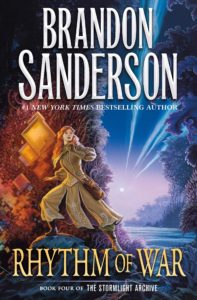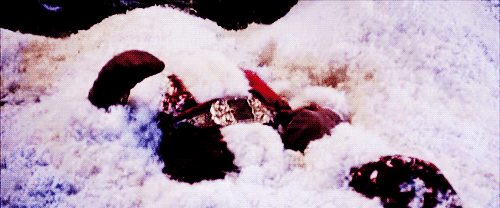 Title: Oathbringer (The Stormlight Archive, #4)
Title: Oathbringer (The Stormlight Archive, #4)
Author: Brandon Sanderson
Genre: Epic fantasy
Publisher: Tor
Year Published: 2020
Pages: 1232
(Reviewed by Chad Curtis)
Note: Spoilers! Like, it’s all spoilers!
I just powered through the climax and resolution of Rhythm of War last night. This is me trying to process it all. This book was complicated for all sorts of reasons. There were many very satisfying parts to it, but it also left me unsettled but it’s hard to describe. I feel like this is the Order of the Phoenix of the series. The whole series has dealt with accepting that reality isn’t black and white, that there are moral gray areas, but the existentialism really ups the ante in this book. There are victories in the book, but they are all qualified in nature. And the more you learn about how the cosmere works, the more background knowledge you get, the less sure you are there is a force for good driving events of the book. That usually is an unspoken assumption in the book that keeps you going, but those assumptions continue to be undermined. For instance, Wit. Wit, Wit, Wit. To me, he originally played a kind of Gandalf-like character. He would show up fix everything just at the right moment, and is infinitely wise. But in this book, we get the idea that he has vested interests that may not be for the good of humanity. It’s only implied, but it’s there. Wit has become more human in that sense. Knowing God was killed was one thing in Oathbringer, but we start to learn about the personal lives of Gods and Heralds that really gives you the impression that there is absolutely no ultimate force of good or even competence running this show.
One connection I made was how much of the theology felt Mormon-esque to me. Then again, Mormonism feels kind of sci-fi in general. We really dive deep into the embodiment of God. While Odium’s influence can permeate Roshar, he has a body that has a physical location. He is finite in this sense. Kind of like the Mormon conception of God that you are taught in primary. Taravangian and Dalinar both start coming to grips with this:
I have stared Odium in the eyes. I have faced him. He expected me to break. By refusing, I’ve upended his plans. It means he can be defeated– and equally important, it means he doesn’t know everything or see everything.
We learn through Rayse’s demise as Odium and Taravangian’s ascension to godhood is that being god essentially works like The Santa Clause: one person becomes god at the demise of the previous one. The new god is bound by all the contracts and obligations of the previous god. Taravangian’s ascension also more clearly explores this unique power struggle between the power of a god and the will of a god. This was dimly hinted at in the chapter headings, but those are always so hard to interpret– something about the shard itself being a vessel, and the power within the shard. Cultivation speaks these words to Taravangian:

In this new role, Taravangian had two sides. One was his knowledge: ideas, understandings, truths, lies… Thousands upon thousands of possible futures opened up to him. Millions of potentials. So numerous that even his expanded godly mind was daunted by their variety.
On the other side was his fury. The terrible fury, like an unbridled storm, churned and burned within. It too was so overwhelming he could barely control it.
This torn-ness of god reveals an internal struggle that you wouldn’t expect in, well, god.
Moving to the moral dilemmas of Jasnah and Dalinar, Dalinar is still trying to find a place for faith in a world where god is dead. And his resolution is to found a new one. Definitely a Joseph Smith-esque take! And I liked how he engages with his niece who is an avowed atheist:
If we’re revealing a new world, Jasnah, should we not do it together? Arguments and all? I feel like… like we are never going to agree on the details, you and I. This book though– it could show that we agree on the more important matters. After all, if an avowed atheist and a man starting his own religion can unite, then who can object that their personal differences are too large to surmount?
That’s what you’re doing, then? Creating a religion?
Revising the old one, at the very least.
Rhythm of War changes your whole reading of Stormlight Archives because it more fully situates the events in Roshar in the broader setting of the entire cosmere. There were hints at broader connections to cosmere in earlier books, but this one makes it absolutely explicit. Navani first experiences this when she realizes Damnation aka Braize is another planet (speaking of Mormon-esque…). This is explained by one of the Heralds, Ash:
Braize isn’t another realm of reality. It’s a planet. You can see it in the sky, along with Ashyn, the Tranquiline Halls, you call it.
Odium makes the war seem ever so small when he explains his braoder plans in the cosmere:
I need soldiers. For the true battle that is coming, not for one people or one miserable windswept continent. A battle of the gods. A battle for everything. Roshar is a training ground. The time will come that I unleash you upon the others who are not nearly as well trained. Not nearly as hardened as I have made you.
Previous books relied on the overpowering idea of trying to defeat a god. I mean, that is impossible. It made the stakes so high and was one of the defining themes of the books. But now, we come to realize more fully that the gods in this book are not capital-G God. If these gods are creatures, created beings, that can make errors in judgment and be outwitted, what does that mean about how the universe runs? Dalinar is perhaps one step ahead of us here. He has been wrestling with these implications since book 3. In Oathbringer, he states his belief that if Honor wasn’t God, then there is a being higher than him.
Sanderson continues incorporating interesting connections to modern concerns. I couldn’t help but think of COVID-19 when we learned of Raboniel’s scheme to wipe out mankind with a manufactured disease. Issues of mental health are more explicitly developed. Kaladin takes it upon himself to try to be a healer of mental illness, which had previously been attended to by priests but very inadequately. And there is even some non-binary representation. The Sibling, the spren of the tower, uses they/them pronouns.
I was reflecting on how Well developed some of the Singer characters become in Rhythm of War. All the flashbacks deal with backstory of Eshonai and Venli prior to the events of book 1. There are multiple Singers with extended character development– Venli, Eshonai, Raboniel, Rlain. This is an important theme in book 4, as the humans previously just viewed the Singers as the enemy. I like the scene where Navani observes Raboniel mourning the loss of her daughter and realizing how human they are.
I still really like Sanderson’s strategy of balancing three-to-four fronts throughout the book: Shallan/Adolin in Shadesmar to seek out Lasting Integrity, Dalinar/Jasnah leading the war in Emul, Navani/Kaladin/Venli holed up in the occupation of Urithuru, and flashbacks of Venli/Eshonai prior to the war. The characters are re-shuffled, giving new interactions and themes. While I appreciated the different storylines, in my opinion Navani made this book. Simultaneously trying to work with the Sibling who views her as morally reprehensible for enslaving spren and trying to save her people by working with/against the Raboniel, the leader of the occupation, is just so good. I tried summarizing the important themes throughout the book:
- The sense of shared responsibility with the spren. (Maya: WE CHOSE and the Sibling: Consequences once chased only humans. With the Recreance, the consequences became ours as well. You have simply sealed that truth as eternal.
- Working together despite very wide differences. (Navani working with the Sibling and Raboniel)
- Individuals can be good, but society can work against you (Rlain: If the humans had a chance to win this war, but at the expense of taking the minds of all the singers as they’d done in the past, would they take it?… The thought disturbed him. He trusted Kaladin and his friends. But humankind? That was asking a lot.)
- Finding a place to exist when you don’t fit in either world. (Venli)
- The costs of immortality. (Raboniel)
- Accepting you can’t save everyone. (Kaladin)
[You can see Chad’s reviews of preceding books in the Stormlight Archive series here: The Way of Kings, Words of Radiance, Oathbringer.]
